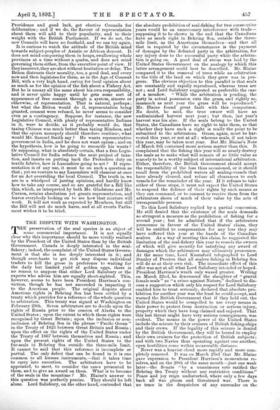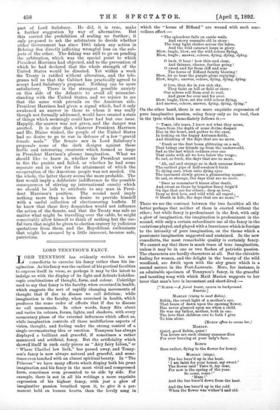THE DISPUTE WITH WASHINGTON.
THEpreservation of the seal species is an object of some commercial importance. It is not equally clear why this importance should be more vividly realised by the President of the United States than by the British Government. Canada is deeply interested in the seal- fishery; indeed, the complaint of the United States Govern- ment is that she is too deeply interested in it ; and though over-haste to get rich may dispose individual traders to kill the goose in preference to waiting for the daily but limited yield of golden eggs, there is no reason to suppose that either Lord Salisbury or the experts who advise him are equally short-sighted. This, however, seems to have been President Harrison's con- viction, though he has not succeeded in imparting it to the American people. The original dispute about American rights in Behring Sea has been settled by a treaty which provides for a reference of the whole question to arbitration. This treaty was signed at Washington on February 29th. Seven arbitrators are to decide upon the rights of Russia prior to the cession of Alaska to the United States ; upon the extent to which these rights were recognised by Great Britain ; upon the inclusion or non- inclusion of Behring Sea in the phrase "Pacific Ocean" in the Treaty of 1825 between Great Britain and Russia ; upon the effect on the rights of the United States under the Treaty of 1867 between themselves and Russia ; and upon the present rights of the United States to the fur-seals in Behring Sea outside the three-mile limit. It cannot be said that this reference is incomplete or partial. The only defect that can be found in it is one common to all human instruments,—that it takes time to carry into execution. The arbitrators have to be appointed, to meet, to consider the cases presented to them, and to give an award on them. What is to become of the seals in the meantime ? Mr. Blaine's answer to this question was perfectly precise. They should be left alone. Lord Salisbury, on the other hand, contended that the absolute prohibition of seal-fishing for two consecutive years would be an unnecessary interference with trade— supposing it to be shown in the end that the Canadians have as much right in Behring Sea, outside the three- mile limit, as the Americans themselves—and that all that is required by the circumstances is the payment of damages by the defeated party in the arbitration, for any injury done to the successful party while the arbitra- tion is going on. A good deal of stress was laid by the United States Government on the analogy by which this latter arrangement could best be described. Mr. Blaine compared it to the removal of trees while an arbitration to the title of the land on which they grew was in pro- gress. The obvious objection to this parallel is that seals are constantly and rapidly reproduced, whereas trees are not ; and Lord Salisbury suggested as preferable the case of a meadow. "While the arbitration is pending, the party in actual possession cuts the grass, and rightly so, inasmuch as next year the grass will be reproduced." Mr. Blaine found great fault with this comparison. No doubt, he said, the true owner will have an undiminished harvest next year ; but then, last year's harvest was his also. If the seals belong to the United States, the Canadians have no right to take them, so that whether they have such a right is really the point to be submitted to the arbitrators. Grass, again, must be har- vested this year, or not at all ; whereas seals, if not taken this year, may be taken next year. But Mr. Blaine's Note of March 8th contained more serious matter than this. It complained that the fishing this year will so nearly destroy the seals as to make what will remain of so little value as scarcely to be a worthy subject of international arbitration. Either, therefore, the British Government should accept the responsibility of the loss thus occasioned, or it should recall from the prohibited waters all sealing-vessels that have already cleared, and refuse all clearances to such vessels for the remainder of the year. If it refuses to take- either of these steps, it must not expect the United States to suspend the defence of their rights by such means as they can command, or to consent to receive them from the arbitrators shorn of much of their value by the acts of irresaponsible persons.
To this Lord Salisbury replied by a partial concession. He still denied that the existence of the seals demands so stringent a measure as the prohibition of fishing for a second year ; but he admitted that if the arbitrators pronounce in favour of the United States' claim, they will be entitled to compensation for any loss they may have suffered this year at the hands of the Canadian sealers. As a way of meeting this claim, he suggested the limitation of the seal-fishery this year to vessels the owners of which will give security for satisfying any award of damages which the arbitrators may ultimately pronounce. At the same time, Lord linutsford telegraphed to Lord Stanley of Preston that all sealers fishing in Behring Sea will do so at their own risk. The immediate effect of this offer was not at all what Lord Salisbury intended or hoped. President Harrison's wrath only waxed greater. Writing on March 22nd, he denounced the slaughter of "gravid female seals" as "a crime against Nature," declined to dis- cuss a suggestion which only his respect for Lord Salisbury enabled him to treat seriously, declared that absolute pro- hibition for another year was the least he could accept, and warned the British Government that if they held out, the United States would be compelled to use every means in their power to protect from destruction or serious injury, property which they have long claimed and enjoyed. That this last threat might have very serious consequences, was evident. The means in the power of the United States include the seizure by their cruisers of British fishing-ships and their crews. If the legality of this seizure is denied by the British Government, they will be bound to employ their own cruisers for the protection of British subjects ; and with two Navies thus operating against one another, open hostilities come within measurable distance.
Never was a heavier cloud more rapidly and more com- pletely removed. It was on March 23rd that Mr. Blaine gave expression to President Harrison's momentous re- solves, and on the 29th of the same month—just one week later—the Senate "by a unanimous vote ratified the Behring Sea Treaty without any restrictive conditions." Peace and joy reign undisturbed, where only a few days back all was gloom and threatened war. There is no trace in the despatches of any surrender on the part of Lord Salisbury. He did, it is true, make a further suggestion by way of alternative. But this carried the prohibition of sealing no further ; it only proposed to ask the arbitrators to decide whether either Government has since 1885 taken any action in Behring Sea directly inflicting wrongful loss on the sub- jects of the other. The fishing was still to go on pending the arbitration, which was the special point to which President Harrison had objected, and to the prevention of which he had declared that the whole strength of the United States would be directed. Yet within a week the Treaty is ratified without alteration, and the tele- grams tell us that the Cabinet has practically agreed to accept Lord Salisbury's proposal. Nothing can be more satisfactory. There is the strongest possible anxiety on this side of the Atlantic to avoid all misunder- standing with the United States, and we rejoice to see that the same wish prevails on the American side. President Harrison had given a signal which, had it only awakened an answer in those to whom it was really though not formally addressed, would have created a state of things which seemingly could have had but one issue. Happily, the answer was not given, and the danger was averted. It is clear that, whatever President Harrison and Mr. Blaine wished, the people of the United States had no desire to go to war in defence of a few "grand female seals." The Senate saw in Lord Salisbury's proposals none of the dark designs against these feeble and interesting creatures which loomed so large in President Harrison's gloomy imagination. What we should like to know is, whether the President meant to fire the prairie and failed, or whether he had some separate end in view for the attainment of which the co-operation of the American people was not needed. On the whole, the latter theory seems the more probable. The first would imply a deliberate indifference to the possible consequences of stirring up international enmity which we should be loth to attribute to any man in Presi- dent Harrison's position. The second need imply nothing more than a keen desire to provide himself with a useful collection of electioneering leaflets. If he knew that these fiery despatches would not influence the action of the Senate, and that the Treaty was safe no matter what might be travelling over the cable, he might conceivably allow himself to think of nothing but the use- ful turn that might be given to election oratory by judicious quotations from them, and the Republican enthusiasm that might be aroused by a little innocent, because safe, patriotism.



































 Previous page
Previous page